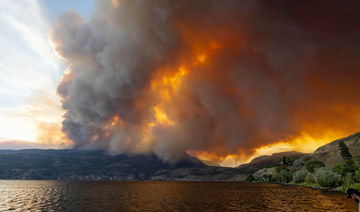LONDON: A group of campaigners who have survived or been left bereaved by terrorist attacks will meet the UK’s home secretary Tuesday to call for a state-funded support scheme.
Brendan Cox, the widower of murdered MP Jo Cox and co-founder of Survivors Against Terror, will tell Priti Patel that granting terror victims minimum guarantees of support should be a key part of the UK’s counter-terrorism strategy.
Ahead of the meeting, he told The Guardian: “Part of our way of saying ‘f*** you’ to terrorists is to show that survivors won’t be left to stew, but will be properly supported by the state.
“Whenever a terror attack happens, ministers get up and talk about how we will look after the survivors, but in reality that isn’t happening.”
SAT will present Patel with a proposed terrorist survivors’ charter that guarantees them immediate financial support, rapid access to psychological support, and a compensation fund.
The eight-point charter also includes guaranteed legal support and a national memorial day for terrorist survivors.
The charter was drawn up in consultation with SAT’s network of 300 people caught up in terrorist incidents across Britain, including the Manchester Arena bombing, the Fishmonger’s Hall stabbings, and the London Bridge attack.
Cox said it was vital that support was coordinated through a state-backed survivors’ hub or agency.
He said: “This shouldn’t be left to the lottery of charity. The shift that we’re calling for is one where there are minimum legal rights. That needs to happen quickly, because we don’t want another generation of survivors to go through what the survivors of the Manchester attack or London Bridge attack had, which was just completely inadequate.”
He added: “There have been survivors who have contemplated suicide, and survivors who have ended up self harming because of that lack of support.”
Cox compared Britain’s approach with that of France or Belgium, saying: “In the UK terror survivors are treated like the victims of a traffic accident, but in France and Belgium and some other countries, attacks on civilians are seen as proxy attacks on the state and therefore the state has a duty to look after them.”
Even French citizens caught up in the London Bridge attack opted to use the French system because it is “more efficient and more generous.”
Prime Minister Boris Johnson has previously promised to consult on a survivors’ charter, and Cox said he and SAT are determined to hold him to that pledge.
“Committing to a consultation isn’t the same as committing to bringing it in, so we are going to keep campaigning until we see the details,” he said. “We need a sort of survivors and victims champion, as opposed to something that just sits within government and does what it is told.”
The Home Office told The Guardian: “We will continue to collaborate closely with Survivors Against Terror to ensure the Survivors Charter informs our review into the wider support package available to victims of terrorism and any subsequent recommendations of that review.”





















